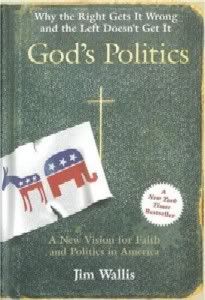WIR -- God's Politics, by Jim Wallis
What I'm Reading. God's Politics: Why the Right Gets It Wrong and the Left Doesn't Get It by Jim Wallis.
A few experpts from the book.
The religious and political Right gets the public meaning of religion mostly wrong--preferring to focus only on sexual and cultural issues while ignoring the weightier matters of justice. And the secular Left doesn't seem to get the meaning and promise of faith for politics at all--mistakenly dismissing spirituality as irrelevant to social change. [page 3]
The real theological problem in America today is no longer the religious Right, but the nationalist religion of the Bush administration, one that confuses the identity of the nation with the church, and God's purposes with the mission of American empire. America's foreign policy is more than pre-emptive, it is theolgically presumptuous; not only unilateral, but dangerously messianic; not just arrogant; but rather bordering on the idolatrous and blasphemous. George Bush's personal faith has prompted a profound slef-confidence in his "mission" to fight the "axis of evil," his "call" to be commander and chief in the war against terrorism, and his definition of America's "reponsibility" to "defend the hopes of all mankind." This is a dangerous mix of bad foreign policy and bad theology.
presumptuous; not only unilateral, but dangerously messianic; not just arrogant; but rather bordering on the idolatrous and blasphemous. George Bush's personal faith has prompted a profound slef-confidence in his "mission" to fight the "axis of evil," his "call" to be commander and chief in the war against terrorism, and his definition of America's "reponsibility" to "defend the hopes of all mankind." This is a dangerous mix of bad foreign policy and bad theology.
But the answer to bad theology is not secularism; it is good theology. It is not always wrong to invoke the name of God and the claims of religion in the public life of a nation, as some secularists say. Where would we be without the moral prophecy of Martin Luther King Jr., who held the Bible in one hand and his Constitution in teh other as he preached, holding us to our best values? Can anyone deny the prophetic leadership of Archbishops Desmond Tutu in South Africa and Oscar Romero in El Salvador? [page 149]
I don't like his writing style -- every paragraph sounds like a sound byte, but his content is very helpful. Be warned, though -- if you consider yourself strongly conservative, you probably won't like the book, you'll probably think he's unfair. He says that he sees a movement growing of likeminded Christians, theologically and morally conservative, but more concerned about social justice than self-righteous sexual purity; more concerned with the poor than with flexing our military muscles. I hope he's right -- I haven't seen a candidate yet, though.
A few experpts from the book.
The religious and political Right gets the public meaning of religion mostly wrong--preferring to focus only on sexual and cultural issues while ignoring the weightier matters of justice. And the secular Left doesn't seem to get the meaning and promise of faith for politics at all--mistakenly dismissing spirituality as irrelevant to social change. [page 3]
The real theological problem in America today is no longer the religious Right, but the nationalist religion of the Bush administration, one that confuses the identity of the nation with the church, and God's purposes with the mission of American empire. America's foreign policy is more than pre-emptive, it is theolgically
 presumptuous; not only unilateral, but dangerously messianic; not just arrogant; but rather bordering on the idolatrous and blasphemous. George Bush's personal faith has prompted a profound slef-confidence in his "mission" to fight the "axis of evil," his "call" to be commander and chief in the war against terrorism, and his definition of America's "reponsibility" to "defend the hopes of all mankind." This is a dangerous mix of bad foreign policy and bad theology.
presumptuous; not only unilateral, but dangerously messianic; not just arrogant; but rather bordering on the idolatrous and blasphemous. George Bush's personal faith has prompted a profound slef-confidence in his "mission" to fight the "axis of evil," his "call" to be commander and chief in the war against terrorism, and his definition of America's "reponsibility" to "defend the hopes of all mankind." This is a dangerous mix of bad foreign policy and bad theology.But the answer to bad theology is not secularism; it is good theology. It is not always wrong to invoke the name of God and the claims of religion in the public life of a nation, as some secularists say. Where would we be without the moral prophecy of Martin Luther King Jr., who held the Bible in one hand and his Constitution in teh other as he preached, holding us to our best values? Can anyone deny the prophetic leadership of Archbishops Desmond Tutu in South Africa and Oscar Romero in El Salvador? [page 149]
I don't like his writing style -- every paragraph sounds like a sound byte, but his content is very helpful. Be warned, though -- if you consider yourself strongly conservative, you probably won't like the book, you'll probably think he's unfair. He says that he sees a movement growing of likeminded Christians, theologically and morally conservative, but more concerned about social justice than self-righteous sexual purity; more concerned with the poor than with flexing our military muscles. I hope he's right -- I haven't seen a candidate yet, though.


2 Comments:
I've wanted to read this book since I heard Wallis interviewed on NPR a number of months ago. Unfortunately, I have no time to read for pleasure right now. Well...I suppose I probably do; I just don't make the time. (I'm sure I will when Harry Potter comes out in a few weeks.)
Your comment that Wallis' writing often strikes you as made up of soundbites strikes a chord with me. I really wish we had models of political discourse in the media. All we ever get are soundbites. Thus I find myself suspicious of the claims of any side in a debate. I think this is a situation that many in my generation find themselves in, which may point toward a reason of widespread apathy toward polities of Gen-X'ers and younger.
In the last presidential campaign, I believe the candidates received 90 seconds to answer a question, 30 seconds for rebuttal, then 15 seconds to respond. What can you say of substance about an issue like war or stem-cell research in 90 seconds? Let alone 15! On the other hand, during the same campaign season I saw a replay of the debate between Bush Sr. and Dukakis (in '88?) and they had something like 7 or more minutes to make their points. Now, I don't remember anyone claiming either of those men to be world-class orators, but by comparison to the talking heads we have to deal with now they were completely engrossing speakers.
I spoke with a pastor at General Assembly who said that he thinks that sermons in the USA will soon be an hour long or more -- he thinks the penduluum is beginning to swing in that direction where people will want carefully-though-out oratory and good thinking. We'll see. Sounds good to me.
Post a Comment
<< Home